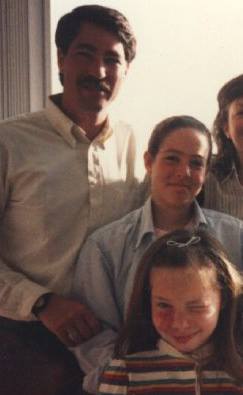We have this great Slack where all the writers from GeekDad and GeekMom hang out and talk. Recently the topic of people asking questions has come up.
I grew up with what’s now referred to as a facial difference. I was born with a large port-wine stain on my right cheek (just did a mental check because I still forget what side it’s on. I’m 36), extending from under my eye to my lip.

My parents told me honestly what my birthmark was and how it had developed, and sent me off into the world.
My sister Sara reports seeing me at 5 years old, patiently explaining to another child how development works in utero. I’d most likely had my hand pressed against my cheek to suck my thumb, thus forcing blood vessels closer to the surface of my skin.
But I remember being at sleepaway camp at 8 when a girl snottily asked, “What happened to your face?” And I knew I didn’t want to be honest with her. I knew I didn’t owe her or anyone an answer. So I told her a long and complicated story that ended with “…and there was SUPER glue and the makeup NEVER came off!” Then I looked deep into her eyes for a few seconds and walked away.

Throughout my life, this has been my approach. Treat respectful people with respect, disdainful people with impatience. As an adult, I’ve made the amendment of always answering children patiently. Children are supposed to be curious, and should be encouraged to ask questions. While at the dentist with my kids, a little girl asked her mother what was on my face. The mom, embarrassed, hissed at her to be quiet while glancing at me. I turned to the little girl, put a big smile on my face, and explained what a birthmark is. Every time the little girls asked another question the mom would snap at her out of embarrassment. But when a child is respectfully asking questions, there’s no reason to be embarrassed. Well, other than the mom’s behavior.
But all of this training for how to be patient and not take offense doesn’t always work. When someone told me that she had run from my face like she would from a horrific car accident, when someone assaulted me to tell me that her son the surgeon could give me a great deal to “fix my face,” when someone accosted me at the synagogue and spent 10 minutes insisting I get laser surgery because she couldn’t imagine I’d heard of it and choose to keep a deformity.
And it has failed me at times as a mother. My youngest son is now 1. He is a beautiful boy, and he has some typical Down Syndrome characteristics, most notably his slanted eyes. And like I experienced myself, people wants to know WHY he looks different than the rest of us. I am happy to answer questions, but I have run into a new roadblock: casual racism. When we brought him home from the hospital my kids asked why he looked Japanese. We explained what they were seeing. Kids ask questions! They should!

But when an adult walks over and in a tone of derision (and the derision is the key point here) asks “Um, is he Asian or something?” I get annoyed. What if he is? Then what? Would it give you the right to take on a nasty tone when asking why he looks different?
This isn’t to say don’t ask questions. I don’t want to shut anyone down; I want questions asked. But sensitivity to those being asked is a must. A courteous question will get you far.
I always think of my friend’s sister and brother-in-law. I met them the weekend that my friend got married, and at the wedding they pulled me aside. The conversation was basically as follows:
Them: We don’t want to overstep or insult you. We really like you and think you’re a special person.
Me: Thank you.
Them: Living in a superficial world can be very hard, and we don’t want you to be held back in any way. We know it can be hard to go through life with a birthmark on your face. If you’ve wanted to remove it but couldn’t afford the surgery, we would cover the cost for you.
Before I continue, think of the difference here between their offer
and the people who have told me I must get rid of it,
or tried to drum up business for their family members.
Me (tears in my eyes): You two are very sweet. I’m really not interested in surgery.
Them: We mean the offer, and it stands at any point in the future if you change your mind. We really want what’s best for you and hope we didn’t offend you!
Me: I’ve had surgery in the past, and decided to keep it. I love my birthmark. You are very loving and generous people and no offense was taken. I appreciate the offer and how much you care.
Now I’m not asking y’all to offer to help random people. But if there was a way to be respectful and non-judgmental for a conversation that delicate, I’m sure everyone can find a way to inquire about hair texture, skin color, or eye shape in a polite way.
Ask away, learn about your world! But please practice kindness as you do it.




